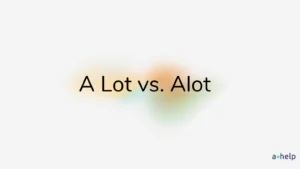Scratching your head trying to figure out if it’s “gray” or “grey”? Well, you’re not alone and many of us have been confused by these two spellings. This color, which sits between black and white, seems to have a bit of an identity crisis, but guess what? Both spellings are perfectly fine! Whether you’re typing an email home or captioning that perfect Instagram shot, knowing which to use can be as simple as remembering where you are in the world right now. Stick around as we spill the tea on this shady problem – it’s not as grey as it seems!

✅ AI Essay Writer ✅ AI Detector ✅ Plagchecker ✅ Paraphraser
✅ Summarizer ✅ Citation Generator
Gray: Only An Adjective?
No! In fact, many English words have a fascinating universality to them. Are there many other languages where the same word with the same spelling and pronunciation may have entirely different functions in a sentence, depending on the context? In English, this is not a rare case, and the word “gray” is only one example. We’re used to it being only a color, therefore, an adjective, however “gray” can also be:
| Part of Speech | Function | Example |
|---|---|---|
| Noun | describes the color itself | The gray of the morning was soothing, unlike any other. |
| Adjective | gives qualities to things | The walls, once a vibrant blue, had settled into a soft gray. |
| Verb | used for actions with a touch of gray (metaphorically or literally) | Her hair began to gray sooner than she expected. |
Regional Differences and a Little Bit of History
The split between “gray” and “grey” is a tale as old as time, well, at least as old as the language itself. It boils down to the whims of spelling standardization over centuries. Modern English evolved with various spellings for many words, and “gray/grey” is no exception. The US adopted “gray” with Noah Webster’s push for unique American English spelling in the 19th century, while the UK and others held onto “grey,” perhaps out of sheer fondness for tradition. It’s a witty tribute to English’s rich history and worldwide reach.
🇺🇸 American Spelling
The “gray” vs. “grey” argument displays the diversity of English language usage in various places. In the United States, “gray” is the traditional spelling, reflecting the distinctive development of American English. You can run your text through a grammar checker just to be sure.
- “The sky turned a dark gray as the storm approached.”
- “She found a light gray paint for the living room walls.”
- “His collection of gray suits was impressive.”
- “The gray cat lounged in the sunny spot on the carpet.”
- “I’m looking for a gray cover for my new phone.”
- “The gray cat lounged in the sunny spot on the carpet.”
- “His collection of gray suits was impressive.”
- “She found a light gray paint for the living room walls.”
🇬🇧 🇨🇦 🇦🇺 🇳🇿 Spelling in other English Speaking Countries
Outside of the United States, notably in the United Kingdom, Canada, Australia, and New Zealand, “grey” is the favored form, reflecting traditional British English. This variety demonstrates the changing nature of language and regional preferences.
- “The grey clouds promised rain later in the day.”
- “Her eyes were the softest shade of grey.”
- “He wore a classic grey blazer to the interview.”
- “A sleek, grey dolphin surfaced beside the boat.”
- “The ancient castle’s stones were a weathered grey.”
- “A sleek, grey dolphin surfaced beside the boat.”
- “He wore a classic grey blazer to the interview.”
- “Her eyes were the softest shade of grey.”
How to Choose Spelling in Proper Names?
The answer is very simple – there’s nothing to choose. When “gray” or “grey” appear in proper nouns and names, the spelling sticks, no matter where you are. Beyond “Earl Grey” tea and personal surnames like “Gray,” there are specific examples where the spelling of “gray/grey” is non-negotiable. Consider the “Greyhound” bus service, an iconic brand name where the “e” is a fixed part of its identity. In science, the “gray” unit measures radiation, always spelled with an “a,” regardless of the country. These examples demonstrate how particular names and terminology retain their spelling in order to preserve historical accuracy, brand identification, and technical specialization, highlighting the unique interplay of language, culture, and tradition.
FAQ
Follow us on Reddit for more insights and updates.





Comments (0)
Welcome to A*Help comments!
We’re all about debate and discussion at A*Help.
We value the diverse opinions of users, so you may find points of view that you don’t agree with. And that’s cool. However, there are certain things we’re not OK with: attempts to manipulate our data in any way, for example, or the posting of discriminative, offensive, hateful, or disparaging material.